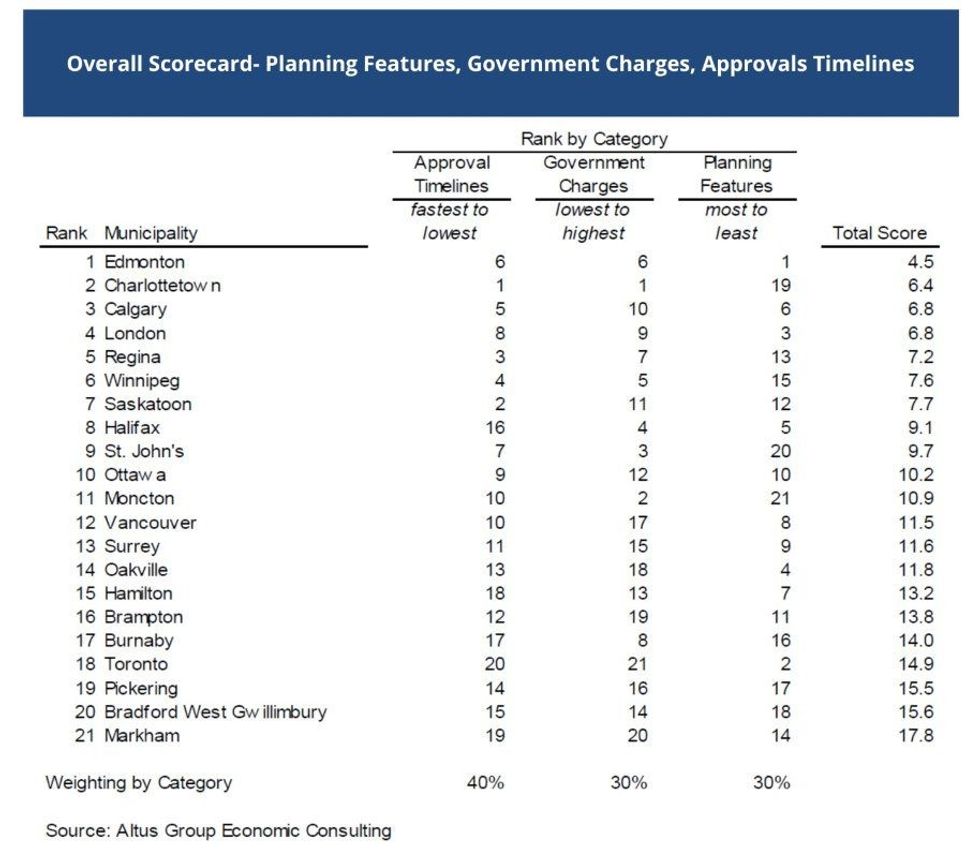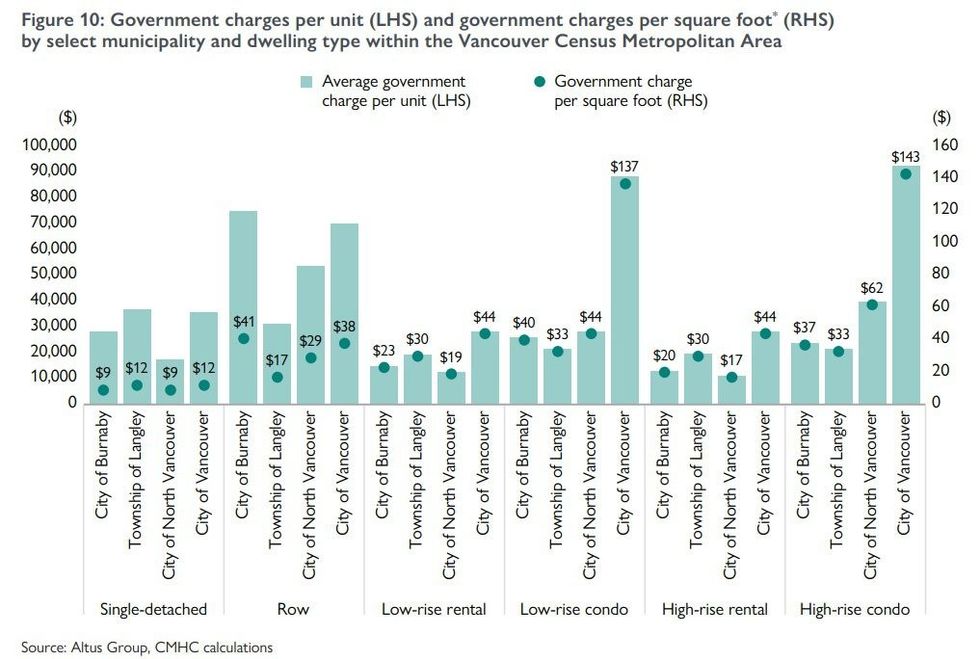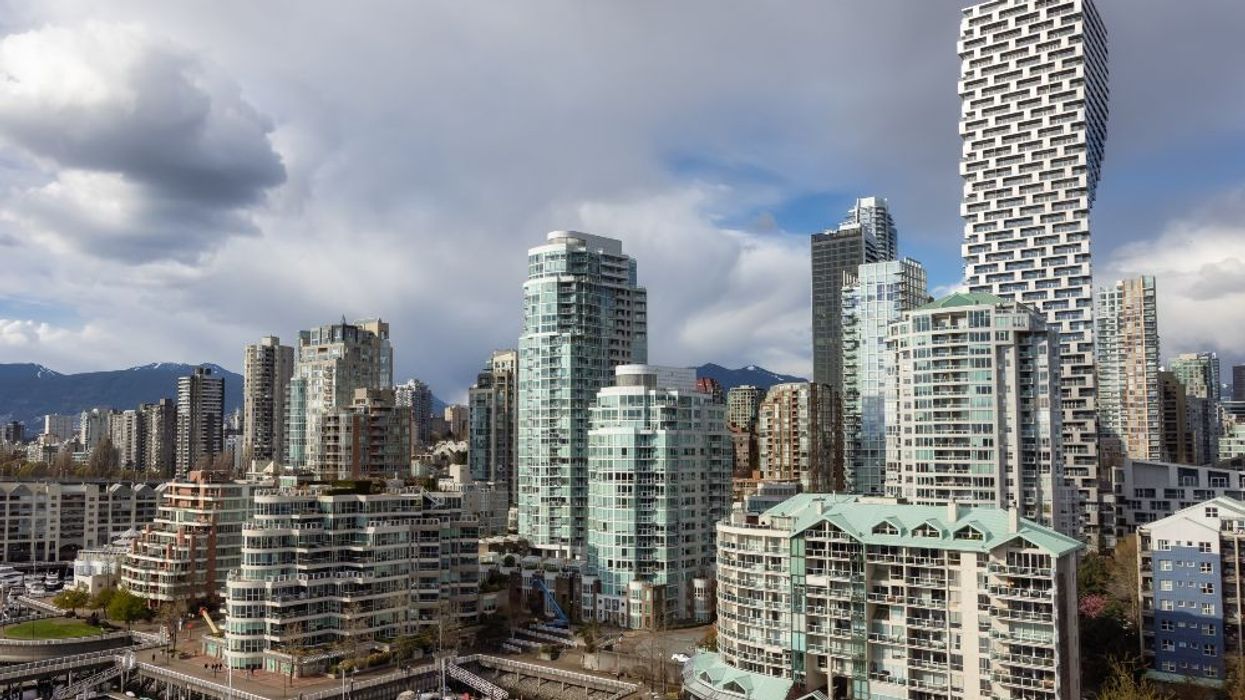Whether we like it or not, building housing is, in most cases, a business, which means if it doesn't make money, it doesn't make sense. In Vancouver, where there is a well-publicized shortage of housing, development fees are so high that while housing still might make money -- as a result of the inordinate market rates -- developers have to at least ask themselves whether it makes sense to go high or go low.
According to a Municipal Benchmarking Report published by the Canadian Home Builder's Association (CHBA) earlier this month, development fees in Vancouver are estimated to be around $125,542 per unit in a high-rise building, 2.6 times more than Surrey ($48,654), 6.5 times more than Burnaby ($19,256), and the steepest in Canada.
The CHBA also estimated development fees for low-rise buildings, with Vancouver sitting at $61,414, Surrey at $84,678, and Burnaby at $29,533. While Vancouver didn't have the highest fees per unit for low-rises, it was the only one of the three BC municipalities included in the report that had a higher per-unit fee for high-rises than low-rises.
The CHBA examined 21 municipalities across Canada and ranked them based on three categories: development approval speeds, government development fees, and planning features. By development fee, Vancouver ranked near the bottom, at 17, with all municipalities ranking lower being those in Ontario. (The rankings take into account both high-rise and low-rise developments.)
In Toronto, which was ranked dead last in terms of development fees, the charge per high-rise unit was estimated at $99,894, and $189,325 per low-rise unit.

Although the numbers differ, the overall findings are in line with a similar study of government charges conducted by the Canada Mortgage and Housing Corporation (CMHC) in July 2022. By the CMHC's numbers, which were sourced from Altus Group, the development fees municipal governments charged were drastically higher in the City of Vancouver than other municipalities such as Burnaby, most notably for condos (about three times more than Burnaby), but also with rentals (about double Burnaby).

In addition to the charges per unit, the CMHC study also looked at the development fees per square foot, which is the more common method of levying development fees. Municipal governments have their own names and definitions for zones, which include some minor differences, but are generally fairly comparable.
According to the City of Burnaby, the development fee for a "Multiple Family High-Density Residential Highrise" is $3.55/sq. ft, which does not include other fees such as those associated with utilities or acquiring parkland.
In Surrey, the equivalent "Multi-Family Residential" has a development fee of $23.92/sq. ft, but does include other charges such as parkland acquisition fees ($6.67) and various charges for utilities.
READ: Vancouver Approves Developments Nearly Three Times Slower Than Calgary
In Vancouver, residential zones that allow for the highest amount of density have a Development Cost Levy of $20.02 / sq. ft, which does not include development charges associated with utilities.
All three base rates do not include fees charged for increased density and/or rezoning, usually called Community Amenity Contributions (CACs). The City of Burnaby emphasizes physical on-site amenities rather than defaulting to a fee. In Surrey, charges can range from $5/sq. ft to $40/sq. ft, depending on location.
In Vancouver, however, CACs can range anywhere from $11.49/sq. ft to $122.32/sq. ft depending on factors like location and size. This is significantly higher than other municipalities in BC and Canada, although these amounts are "targets" and can often be negotiated on a case-by-case basis.
In December, Vancouver City Councillor Sarah Kirby-Yung brought a motion to council that would see the City establish fixed rates for CACs, as the existing process that allows for negotiations can result in delays in delivery of projects. A plan is expected to be presented to council in Q1 2023.
Aside from affordability of housing, a big component of Vancouver's housing crisis is defined by a shortage of supply. Few developers are steadfastly against developing housing, but a variety of factors have resulted in an environment where that sometimes doesn't make financial sense, or where developing condos makes more sense than developing affordable rentals.
"Vancouver recorded the highest municipal charges per unit for high-rise developments [in Canada], driven by high community amenity charge fees," the CHBA said. "The ratio of charges per square foot for high-rise compared to low-rise is the highest in the City of Vancouver."
With development approval timelines already slow, which translates to additional costs for developers and then users, the high development fees certainly do not help make building rental housing appealing. In Vancouver, that's yet another thing we cannot afford.





















